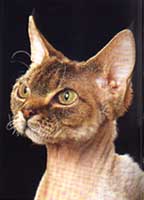THE WONDERFUL WONDERFUL CAT


The Devon Rex is not a common cat: it is eccentric and extremely sensitive.
These characteristics must lead one to consider carefully the idea of making it our house-cat:
it is suitable only to those who possess in fact a certain experience with animals, that might be endowed with an extreme sensitivity and who can dedicate much time to him,
because the Devon Rex needs a lot of company and a lot of attention.
Members of this breed live well in enclosed environments, which must be well heated,
and they are ideal for people who love cats but are allergic to their hair (since they do not shed).

|
THE ORIGINS The
origins of the Devon Rex are recent and its story is somewhat
unique: in 1960, thanks to the union of a domestic cat, the
property of Mrs.Beryl Cox, and a street-cat, was born a black
male cat very particular, similar to an elf that had curly and
big ears. Mrs.Cox, despite the strange features of the kitten,
she kept it and called it Kirlee. |
|
THE CHARACTER The
Devon Rex is the exception to the rule which asserts that the
first impression is what counts. |
|
THE IDEAL DEVON REX The
appearance of the Devon Rex is very peculiar and atypical. |
|
THE COLOR OF THE HAIR The
particularity of the Devon Rex does not concern the color of
the coat, but its texture and lenght: it has short and wavy
hair. The shade which characterizes the basic color is very
varied: infact all the variations of color and patterns are
being accepted, including the two-tone and the coat with the
points of a Siamese (Si-Rex). |
|
THE CARE The
Devon Rex shows availability, cheerfulness and vivaciousness
only when it knows it can trust its own master. To win its trust
it is necessary to follow some little suggestions. It is by
nature very trusting but they love cosy and concealed places
not because of shyness, but because it loves the warmth; it
needs a lot of security and therefore, when one welcomes him
into ones own home, one must not forget to create a little nest
for it.Its bodily cleaning does not require a lot of work because
its hair is very short and it keeps itself perfectly clean by
itself.Instead the cleaning of its ears merits particular attention:
being almost without hair it is easy for them to become receptacles
for dust. The important thing is to avoid colds, for it is in
the wintertime one must not forget to put a little wool coat
on it, but only in cold places and outside the house. Furthermore,
if it must be entered in a cat show, the bath must be given
2 or 3 days before, otherwise its hair will not lay close to
its skin. One last trick in regards to its feeding:on account
of a robust and excessive appetite it is often subject to intestinal
disturbances;to avoid this risk, it is necessary to give it
many small meals and to subdivide its food into small quantities. |
|
From Thanks very much to my friend Vincenzo Gioia for translation from Italian to English. |